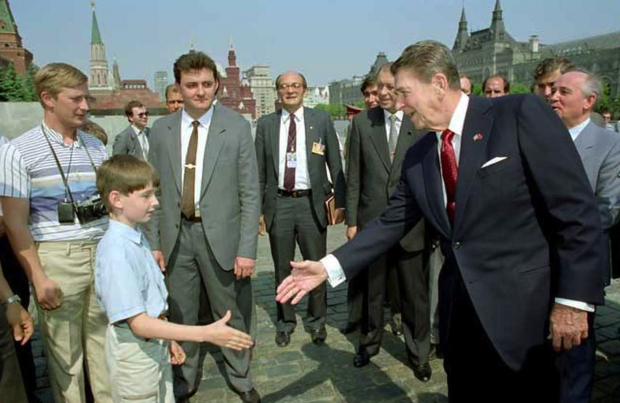 Donald Trump wants closer and friendly ties with Russia and has long declared he will push for a realignment towards a US-Russian alliance. Figures sympathetic to Trumps Russia policy and who have commercial ties to the Putin regime are being appointed to key positions in the incoming Trump Administration.
Donald Trump wants closer and friendly ties with Russia and has long declared he will push for a realignment towards a US-Russian alliance. Figures sympathetic to Trumps Russia policy and who have commercial ties to the Putin regime are being appointed to key positions in the incoming Trump Administration.
The rationale behind this major shift in US foreign policy is framed as the modern equivalent of Richard Nixon’s opening of relations with China and détente with the Soviet Union. Upon becoming President Nixon had to confront an American foreign policy in crisis. The war in Vietnam was dragging on and inflaming US political divisions, Communist insurrections were raging over South East Asia, China was exerting its influence in Asia, and the Soviet Union had crushed an attempt by the Czechoslovakians to democratise.
The new president was the most prominent anti-Communist in American political life and had routinely declared his willingness to use force to stop the rise of Communist hegemony. Nixon was seeking a means for withdrawing from Vietnam without triggering an expansion of communist influence in South East Asia. And most important of all Nixon wanted to preserve and enhance the power of the United States while effectively ceding a quasi but costly victory to the North Vietnamese.
Nixon withdrew US forces from South Vietnam while splitting China away from the Soviet Union, forcing China to pressure the North Vietnamese into cooperating, compelling both Beijing and Moscow to accept US pre-eminence in Asia and concluding a series of arms limitations agreements with the Soviet Union.
However, Nixon did not declare well in advance his desire for closer relations with either China or the Soviet Union. Much less did he espouse an endless stream of praise for Brezhnev or Mao or that they were more worthy of respect than the sitting US president. Nixon began his presidency intensifying the unwinnable conflict with Vietnam but ended it having divided and weakened the Communist powers and thus returned the United States to its perceived position as the dominant superpower.
Nixon did not openly declare his desired foreign policy objectives in advance the way Trump has done since he declared for the presidency. In a negotiation, the players begin by stating their opening position and through displays of strength and the willingness to walk away the players arrive at a deal that is not what they originally stated but is agreeable to both parties. You want one thing, you ask for another and you settle for another.
Trump describes himself as a master dealmaker and negotiator but he has prejudiced any future negotiations with Putin by making it crystal clear that he wants (and now needs) good relations with Russia. This puts Putin in a position where he can effectively dictate to the US President what he expects in return for Russia’s friendship.
And we don’t know what it is that Putin will demand of President Trump. Perhaps in return for cooperation against ISIS, the United States will withdraw assistance from Ukraine and the Baltic states. As a precondition for Russian pressure on the Iranian nuclear program will Trump facilitate Russian penetration of governments in Central Asia? If Trump seeks Russian support to contain China or deal with North Korea will he betray long-standing American support for the NATO alliance?
Trump is set to appoint people to prominent positions in his administration who have close connections to the Russian regime. Rex Tillerson, nominee for Secretary of State accepted a medal of friendship from Putin. Michael T Flynn, National Security Advisor designate, has been a regular guest on the state-owned RT network. Future chief strategist to the President Steve Bannon has long been an apologist for Russia’s aggression in Ukraine.
With so many Russophiles in the White House, how can Putin not be tempted to push harder for greater rewards from a President so eager for a US-Russian alliance? Trump, like any statesman, must be willing to walk away from a negotiation when the price is too high. Maybe when faced with the reality of Putin’s objectives he will sever the cord but so far he has posited that his administration will succeed in rekindling US-Russian cooperation as a means to achieve global peace. If this proves unworkable he is setting himself up for disappointment at which point he will either have to junk his whole foreign policy agenda and start afresh or he will double down and make the relationship with Putin work no matter the consequences for global security or US allies.
Obama made similar mistakes with the Iranian nuclear agreement. The US negotiating team sent strong signals to their Iranian counterparts that they desperately wanted the deal and would make accommodations to Tehran in order to secure their agreement. This included a provision that should Iran violate the agreement it would be near to impossible to reimpose sanctions and another winding back sanctions for Iran’s sponsorship of terrorism.
US Secretary of State John Kerry early on declared publically his support for obtaining the agreement and became directly involved in the negotiations. This has the effect of signalling clear as day that the US administration was united in its desire to secure an agreement. Ideally, Secretary Kerry should have placed himself at arm’s length so as not to signal undue eagerness and that in the event an equitable agreement could not be reached the Obama administration could pull back without embarrassment. Instead, the administration shackled itself to the idea of a successful agreement because it had talked itself into one from the beginning.
Trump may demonstrate strength in a way that Obama has refrained from and he may very well be less keen to overextend America’s already taxed resources on complicated interventions like Afghanistan, Iraq and Libya. But it is not a sign of strength to announce in advance your desire for a new relationship with a leader who plays the game as hard as Vladimir Putin. As Reagan implored, America achieves great results for the world when it negotiates from a position of strength, not a position of willingness. For willingness can quickly morph into weakness.
Got something to add? Join the discussion and comment below.
Get 10 issues for just $10
Subscribe to The Spectator Australia today for the next 10 magazine issues, plus full online access, for just $10.

























Comments
Don't miss out
Join the conversation with other Spectator Australia readers. Subscribe to leave a comment.
SUBSCRIBEAlready a subscriber? Log in